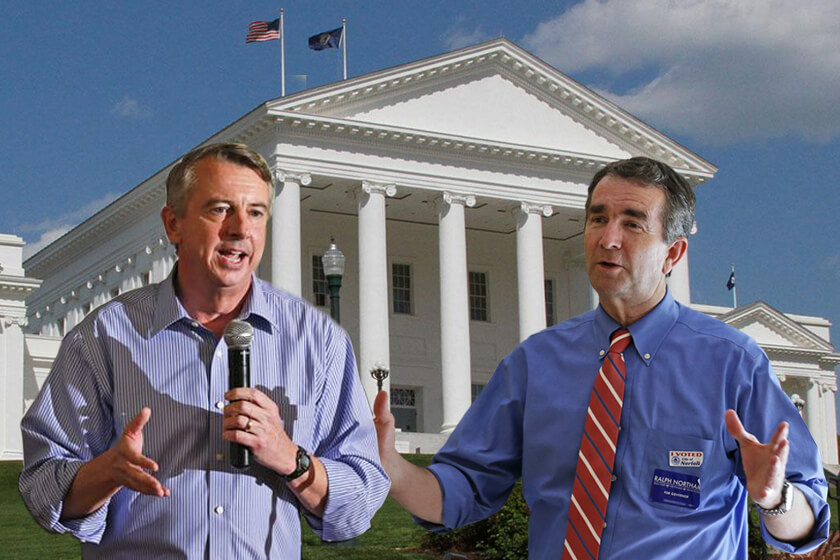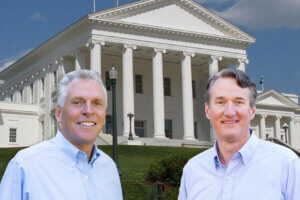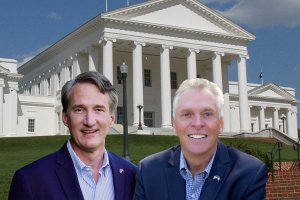West Long Branch, NJ – Democrat Ralph Northam currently holds a 5 point lead over Republican Ed Gillespie in the race for Virginia governor. The Monmouth University Poll finds that Northam has gained support in the western half of the Commonwealth, an area that is traditionally a GOP stronghold. The Democrat, who is a pediatric neurologist as well as the state’s current Lieutenant Governor, holds a significant advantage on being seen as better able to handle the issue of health care, which voters identify as one of their top concerns in this election.
Currently, 49% of likely voters support Northam and 44% support Gillespie. Libertarian candidate Cliff Hyra gets 2% of the vote and 4% are undecided. Two months ago, Monmouth found a tied race at 44% each for Northam and Gillespie, with Hyra at 3% and undecided at 9%. Compared to July, Northam has increased his support particularly among voters age 50 to 64 (up 12 points to 50%), women (up 7 points to 57%), and white voters (up 7 points to 43%).
“It appears that many previously undecided voters have moved into the Democrat’s camp,” said Patrick Murray, director of the independent Monmouth University Polling Institute.
There are some interesting regional differences in current vote intentions. Northam has a 17 point lead over Gillespie in Northern Virginia (56% to 39%) and a 9 point lead in the eastern part of the Commonwealth (49% to 40%), both of which are in line with July’s results. The race remains virtually tied in Central Virginia, with a negligible 49% to 48% result in Northam’s favor whereas Gillespie had a 2 point nominal edge in the prior poll. The Democrat has made up significant ground, though, in the western half of the Commonwealth where he trails the Republican by only 7 points (50% Gillespie and 43% Northam). This area is a traditional GOP stronghold where Gillespie held a sizable 18 point advantage just two months ago.
“Northam may not have quite the level of support in Northern Virginia as current governor Terry McAuliffe did in his 2013 race, but he has the potential to outperform the incumbent Democrat’s showing in the more conservative western part of the Commonwealth. The fact that Republicans once courted Northam to switch to their party probably doesn’t hurt his credibility with that electorate,” said Murray. Four years ago, McAuliffe won Northern Virginia by 22 points (58% to 36%) but he lost the western part of the Commonwealth by a nearly identical margin to Republican Ken Cuccinelli (36% to 57%).
In terms of issues driving this campaign, health care (22%) and jobs and the economy (22%) continue to be the predominant concerns for voters in this race. The next tier of important issues include education (14%), taxes (9%), and illegal immigration (9%).
Voter opinion is divided on which candidate would best handle the top two issues, but the Democrat has a much stronger advantage on health care than the Republican does on jobs and the economy. Specifically, when asked who is likely to do a good job on health care, 45% say only Northam, 29% say only Gillespie, 7% say both, and 12% say neither. When asked who is likely to do a good job on the economy, 38% say only Gillespie, 33% say only Northam, 14% say both, and 8% say neither.
“Anxiety about health care has become a predominant public concern across the country. If Washington Republicans manage to repeal Obamacare this week, they could end up handing Democrats a huge advantage in the Virginia governor’s race,” said Murray.
Northam also has a strong advantage on education, a perennial issue in the Commonwealth – 45% say he would do a good job on education compared to 28% who prefer Gillespie. Gillespie has a smaller advantage on taxes – 40% say he would do a good job compared to 33% who prefer Northam. There is no clear edge on the issue of illegal immigration – 36% prefer Gillespie and 35% prefer Northam. Likewise, handling the state budget is not a breakout issue for either candidate – 39% prefer Gillespie and 33% prefer Northam – and the same is true for transportation where 29% prefer Northam and 27% prefer Gillespie.
The Commonwealth has faced a soul-searching debate around what to do with Confederate monuments and voters are divided on who would better handle this issue – 31% say Northam, 29% say Gillespie, 7% say both, and 18% say neither. When it comes to the larger issue of race relations, though, Northam has the edge – 37% prefer the Democrat, 22% prefer the Republican, and 13% say both would do a good job, while nearly 1-in-5 Virginia voters (18%) say neither candidate would do a good job handling race relations.
The GOP nominee has been trying to gain an edge by painting his opponent as soft on crime and opposed to new energy infrastructure such as the Atlantic Coast Pipeline. Gillespie does have an advantage on both these issues – 35% prefer him on crime compared to 27% for Northam and 35% prefer Gillespie on energy infrastructure compared to 29% for Northam. The problem for the Republican is that only 4% of voters say crime is the most important issue for them and just 2% say the same about energy infrastructure.
Both major party candidates have become better known since the summer, but opinion of the Republican remains slightly more negative than for the Democrat. Specifically, Gillespie is viewed favorably by 42% of likely voters (which is up from 36% in July) and unfavorably by 31% (which is up from 20% two months ago). Northam, on the other hand, is viewed favorably by 45% of the electorate (which is up from 38% in July) and unfavorably by 27% (which is up from 16% two months ago). Just 13% of voters have formed an opinion of Hyra (4% favorable and 9% unfavorable).
Most Virginia voters say this year’s gubernatorial contest has been largely positive (56%) while 30% say it has been negative and 6% say it has been a bit of both. Among the minority who see the campaign as negative, more put the blame on Gillespie (36%) rather than Northam (19%), while 38% blame both candidates equally.
The Monmouth University Poll also finds that just 40% of likely voters in Virginia approve of the job Donald Trump is doing as president while 55% disapprove, which is slightly more positive than his 37%–57% rating two months ago.
The current governor, Democrat Terry McAuliffe, earns a much stronger 55% approve and 36% disapprove rating from Virginia voters for his job performance – which is a slight uptick from his 52%–37% rating in July.
“To the limited extent that voters are looking at these candidates as proxies for current office holders, the advantage has to go to Northam,” said Murray.
The Monmouth University Poll was conducted by telephone from September 21 to 25, 2017 with 499 Virginia residents likely to vote in the 2017 gubernatorial election. The results in this release have a margin of error of +/- 4.4 percent. The poll was conducted by the Monmouth University Polling Institute in West Long Branch, NJ.
QUESTIONS AND RESULTS
(* Some columns may not add to 100% due to rounding.)
1/2. If the election for governor was today, would you vote for Ed Gillespie the Republican, Ralph Northam the Democrat, or Cliff Hyra the Libertarian? [IF UNDECIDED: If you had to vote for one of the following at this moment, do you lean more toward Ed Gillespie or Ralph Northam?] [NAMES WERE ROTATED]
| TREND: Likely voters with leaners | Sept. 2017 | July 2017 |
| Ed Gillespie | 44% | 44% |
| Ralph Northam | 49% | 44% |
| Cliff Hyra | 2% | 3% |
| (VOL) Other/write-in |
<1% |
<1% |
| (VOL) Undecided |
4% |
9% |
| (n) | (499) | (502) |
[QUESTIONS 3, 4 & 5 WERE ROTATED]
3. Is your general impression of Ed Gillespie favorable or unfavorable, or do you have no opinion of him?
| TREND: | Sept. 2017 | July 2017 |
| Favorable | 42% | 36% |
| Unfavorable | 31% | 20% |
| No opinion | 28% | 44% |
| (n) | (499) | (502) |
4. Is your general impression of Ralph Northam favorable or unfavorable, or do you have no opinion of him?
| TREND: | Sept. 2017 | July 2017 |
| Favorable | 45% | 38% |
| Unfavorable | 27% | 16% |
| No opinion | 28% | 46% |
| (n) | (499) | (502) |
5. Is your general impression of Cliff Hyra favorable or unfavorable, or do you have no opinion of him?
| Sept. 2017 | |
| Favorable | 4% |
| Unfavorable | 9% |
| No opinion | 88% |
| (n) | (499) |
[QUESTIONS 6 & 7 WERE ROTATED]
6. Do you approve or disapprove of the job Donald Trump is doing as president?
| TREND: | Sept. 2017 | July 2017 |
| Approve | 40% | 37% |
| Disapprove | 55% | 57% |
| (VOL) Don’t know | 6% | 6% |
| (n) | (499) | (502) |
7. Do you approve or disapprove of the job Terry McAuliffe is doing as governor?
| TREND: | Sept. 2017 | July 2017 |
| Approve | 55% | 52% |
| Disapprove | 36% | 37% |
| (VOL) Don’t know | 9% | 11% |
| (n) | (499) | (502) |
8. I’m going to read you a list of issues that the next governor may have to handle. Regardless of who you will vote for, please tell me who is likely to do a good job on each issue – only Ed Gillespie, only Ralph Northam, both of them, or neither of them. [ITEMS WERE ROTATED] [READ PERCENTAGES ACROSS ROWS FOR THIS TABLE]
|
Only Gillespie |
Only Northam |
Both |
Neither |
(VOL) |
(n) | |
| Jobs and the economy | 38% | 33% | 14% | 8% | 7% |
(499) |
| Taxes | 40% | 33% | 8% | 12% | 8% |
(499) |
| Education | 28% | 45% | 11% | 8% | 8% |
(499) |
| Race relations | 22% | 37% | 13% | 18% | 11% |
(499) |
| Dealing with Confederate monuments | 29% | 31% | 7% | 18% | 15% |
(499) |
| The state budget | 39% | 33% | 10% | 10% | 8% | (499) |
| Health care | 29% | 45% | 7% | 12% | 8% | (499) |
| Illegal immigration | 36% | 35% | 8% | 13% | 8% | (499) |
| Energy infrastructure, such as pipelines | 35% | 29% | 11% | 10% | 14% | (499) |
| Transportation | 27% | 29% | 18% | 13% | 13% | (499) |
| Crime | 35% | 27% | 19% | 10% | 10% | (499) |
9. And which one of the issues I just mentioned is most important to you in deciding your vote for governor? [ITEMS WERE ROTATED]
| Sept. 2017 | |
| Jobs and the economy | 22% |
| Taxes | 9% |
| Education | 14% |
| Race relations | 3% |
| Dealing with Confederate monuments | 3% |
| The state budget | 4% |
| Health care | 22% |
| Illegal immigration | 9% |
| Energy infrastructure, such as pipelines | 2% |
| Transportation | 2% |
| Crime | 4% |
| (VOL) Other | 3% |
| (VOL) Don’t know | 2% |
| (n) | (499) |
10. So far, would you characterize the governor’s race as being generally positive or negative?
| Sept. 2017 | |
| Positive | 56% |
| Negative | 30% |
| (VOL) Both positive and negative | 6% |
| (VOL) Don’t know | 9% |
| (n) | (499) |
[The following question was asked of those who said “NEGATIVE” or “BOTH” in Q10; n=183; moe = +/- 7.3%]
11. Who has been more negative – Gillespie or Northam, or both equally?
| Sept. 2017 | |
| Gillespie | 36% |
| Northam | 19% |
| Both equally | 38% |
| (VOL) Don’t know | 7% |
| (n) | (183) |
METHODOLOGY
The Monmouth University Poll was sponsored and conducted by the Monmouth University Polling Institute from September 21 to 25, 2017 with a statewide random sample of 499 likely Virginia voters drawn from a list of registered voters who voted in at least two of the last four general elections or have registered to vote since January 2016, and indicate they are likely to vote in the upcoming election. This includes 276 contacted by a live interviewer on a landline telephone and 223 contacted by a live interviewer on a cell phone. Monmouth is responsible for all aspects of the survey design, data weighting and analysis. Final sample is weighted for region, party primary voting history, age, gender, and race based on state voter registration list and U.S. Census information. Data collection support provided by Braun Research (field) and Aristotle (voter sample). For results based on this sample, one can say with 95% confidence that the error attributable to sampling has a maximum margin of plus or minus 4.4 percentage points (unadjusted for sample design). Sampling error can be larger for sub-groups (see table below). In addition to sampling error, one should bear in mind that question wording and practical difficulties in conducting surveys can introduce error or bias into the findings of opinion polls.
VA Regions:
NoVa – Loudon, Fairfax, Arlington, and Prince William counties and included cities.
East – counties and cities along the Chesapeake Bay and tributary rivers (James, York, Rappahannock), including Hampton Roads, Virginia Beach, Newport News and Norfolk.
Central – Counties and cities that straddle either side of I-95, including Richmond.
West –the area west of a north-south line from Clarke/Fauquier to Mecklenburg counties.
| DEMOGRAPHICS (weighted) |
| Primary Voting History |
| 50% Republican |
| 36% Democrat |
| 14% Neither |
| Self-Reported Party ID |
| 25% Republican |
| 43% Independent |
| 32% Democrat |
| 48% Male |
| 52% Female |
| 8% 18-34 |
| 20% 35-49 |
| 38% 50-64 |
| 34% 65+ |
| 75% White |
| 16% Black |
| 3% Hispanic |
| 6% Asian/Other |
Click on pdf file link below for full methodology and results by key demographic groups.




